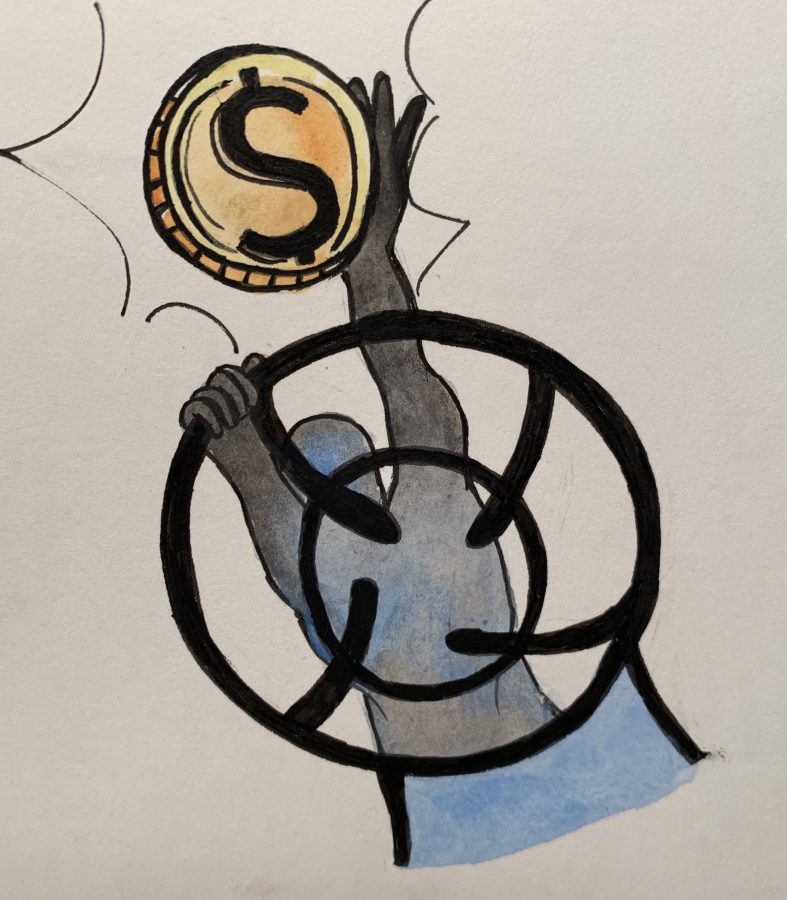Who’s still peeved that we lost to TCU? Who’s hyped to crush Kansas State on Saturday?
Who’s frustrated that instead of compensating student-athletes who work so hard in those games, UT is spending $175 million to expand the football stadium they play in — $175 million more than those students get for their efforts?
The most common refrain favoring the National Collegiate Athletic Association’s treatment of student-athletes — treatment that nets the organization approximately a billion dollars a year — appears on their website: The collegiate sports system provides benefits to student-athletes. Chief among these “benefits” is attending college often on scholarship, the argument goes.
However, this “benefit” is limited.
“Being an athlete affects which academic career you want to pursue because of the rigorous schedule,” said Jase Febres, a UT communication studies junior and shooting guard, who’s on a full scholarship.
For Febres and other student-athletes, college has strings attached. If they choose classes over athletics, they lose their scholarship. If they choose athletics over classes, they lose their education, followed by their scholarship.
“You can’t truly put 100% into one because the other will drop, so it depends on what you value more — sports or education,” Febres said.
The current system treats student-athletes like they’re not human, like they don’t have reasonable limits on their time and abilities.
The NCAA allows 20 hours per week for “countable athletically related activities.” But this “limit” doesn’t include hours of strength and aerobic training exercises or hours of travel time for away games, said Febres and Dr. Devin Walker, the director of Global Leadership and Social Impact at the UT Division of Diversity and Community Engagement and an organizer for the Black Student-Athlete Summit. Walker said these loopholes are constantly exploited in order to further overwork the students.
Student-athletes work for no pay, so they can keep going to classes, which take up even more time and effort. Furthermore, they can’t take full advantage of these classes because they’re so burdened by the college sports system.
And this is exactly why the NCAA concocted the term “student-athlete.”
Perhaps the cheapest refrain of supporters of the current system is, “Student-athletes are students; they are not employees.” This interpretation, from NCAA president Mark Emmert, is purposefully misleading. UT refers to its employed students as “student employees” and pays them nonetheless. The label intends to hide the fact that these “student-athletes” are human beings and thereby justify treating them as less than human. All people deserve to be paid for their work.
Last week, the NCAA voted to allow student-athletes “to benefit from the use of their name, image and likeness … in a manner consistent with the collegiate model,” which is a troubling caveat.
As with the term “student-athlete,” the NCAA chose its words carefully: “The collegiate model” is the current, “amateur” model. “Compensation for athletics performance or participation is (still) impermissible,” meaning the profits from student-athletes’ labor still accrue to the NCAA, not them. So in addition to academics and athletics, if student-athletes want to take advantage of this change, they’ll have to self market — even more work.
This remedy is further flawed because most student-athletes can’t even profit from self-marketing because they’re not well-known, Walker said.
Walker and others anticipate the profits will largely accrue to the best-known sports, such as football and basketball, which are the most profitable for the NCAA and college athletics departments. Then the profit will further fracture, and most of it would go to the best-known athletes within those sports. This could divide student-athletes when they should be united in their shared struggles.
Sports are entertainment, and entertainment is a business. Businesses pay their employees for the value of their work. The massive revenue some UT coaches and the University have gained has to be redistributed to fairly compensate student-athletes, and there are UT organizations well-positioned to negotiate what’s truly fair if the profiteers will come to the table.
But if the NCAA and college athletics departments, including UT’s, refuse to even consider fair, proportionate compensation, remember that you — the spectator and fan — are the engine that keeps this machine chugging along.
You provide the value, and you determine who gets it.
Rathi is a Black Studies senior from Austin.





















